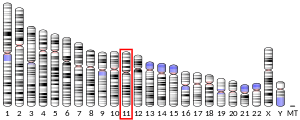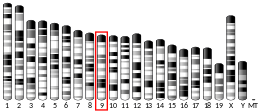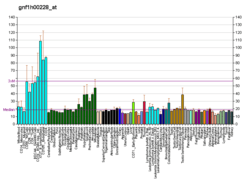CWC15
Protein CWC15 homolog is a protein that in humans is encoded by the CWC15 gene.[5][6][7]
Interactions
CWC15 has been shown to interact with CDC5L.[8]
gollark: Yes, certainly, space civilization good.
gollark: Well, no, more of a space [HELP ME I DO NOT KNOW HOW STABLE GOVERNMENTS CAN HAPPEN]ocracy.
gollark: I said "no" to some of the space empire ones.
gollark: I'm not entirely sure how anti-groupism and one-world-governmentism are compatible.
gollark: Apparently it puts me at "social darwinism", "one world government", "individualist", "anti-moral", "anti-groupism", "modern technology", "post-race", "secular", "regional centrism", "don't care ism", "realistic" and "irenic".
References
- GRCh38: Ensembl release 89: ENSG00000150316 - Ensembl, May 2017
- GRCm38: Ensembl release 89: ENSMUSG00000004096 - Ensembl, May 2017
- "Human PubMed Reference:". National Center for Biotechnology Information, U.S. National Library of Medicine.
- "Mouse PubMed Reference:". National Center for Biotechnology Information, U.S. National Library of Medicine.
- O'Brien KP, Tapia-Paez I, Stahle-Backdahl M, Kedra D, Dumanski JP (Jul 2000). "Characterization of five novel human genes in the 11q13-q22 region". Biochem Biophys Res Commun. 273 (1): 90–4. doi:10.1006/bbrc.2000.2910. PMID 10873569.
- Ohi MD, Link AJ, Ren L, Jennings JL, McDonald WH, Gould KL (Mar 2002). "Proteomics analysis reveals stable multiprotein complexes in both fission and budding yeasts containing Myb-related Cdc5p/Cef1p, novel pre-mRNA splicing factors, and snRNAs". Mol Cell Biol. 22 (7): 2011–24. doi:10.1128/MCB.22.7.2011-2024.2002. PMC 133674. PMID 11884590.
- "Entrez Gene: HSPC148 hypothetical protein HSPC148".
- Ajuh, P; Kuster B; Panov K; Zomerdijk J C; Mann M; Lamond A I (Dec 2000). "Functional analysis of the human CDC5L complex and identification of its components by mass spectrometry". EMBO J. 19 (23): 6569–81. doi:10.1093/emboj/19.23.6569. ISSN 0261-4189. PMC 305846. PMID 11101529.
External links
- Human CWC15 genome location and CWC15 gene details page in the UCSC Genome Browser.
Further reading
- Suzuki Y, Yamashita R, Shirota M, et al. (2004). "Sequence comparison of human and mouse genes reveals a homologous block structure in the promoter regions". Genome Res. 14 (9): 1711–8. doi:10.1101/gr.2435604. PMC 515316. PMID 15342556.
- Strausberg RL, Feingold EA, Grouse LH, et al. (2003). "Generation and initial analysis of more than 15,000 full-length human and mouse cDNA sequences". Proc. Natl. Acad. Sci. U.S.A. 99 (26): 16899–903. Bibcode:2002PNAS...9916899M. doi:10.1073/pnas.242603899. PMC 139241. PMID 12477932.
- Zhang QH, Ye M, Wu XY, et al. (2001). "Cloning and functional analysis of cDNAs with open reading frames for 300 previously undefined genes expressed in CD34+ hematopoietic stem/progenitor cells". Genome Res. 10 (10): 1546–60. doi:10.1101/gr.140200. PMC 310934. PMID 11042152.
- Suzuki Y, Yoshitomo-Nakagawa K, Maruyama K, et al. (1997). "Construction and characterization of a full length-enriched and a 5'-end-enriched cDNA library". Gene. 200 (1–2): 149–56. doi:10.1016/S0378-1119(97)00411-3. PMID 9373149.
- Bonaldo MF, Lennon G, Soares MB (1997). "Normalization and subtraction: two approaches to facilitate gene discovery". Genome Res. 6 (9): 791–806. doi:10.1101/gr.6.9.791. PMID 8889548.
- Maruyama K, Sugano S (1994). "Oligo-capping: a simple method to replace the cap structure of eukaryotic mRNAs with oligoribonucleotides". Gene. 138 (1–2): 171–4. doi:10.1016/0378-1119(94)90802-8. PMID 8125298.
This article is issued from Wikipedia. The text is licensed under Creative Commons - Attribution - Sharealike. Additional terms may apply for the media files.




